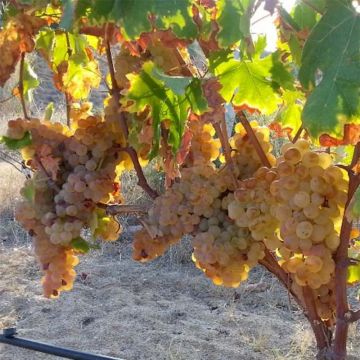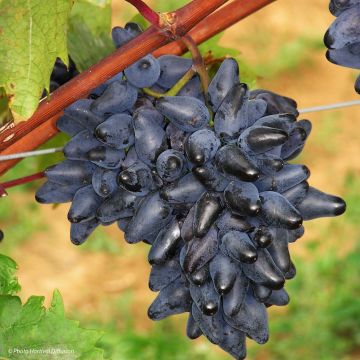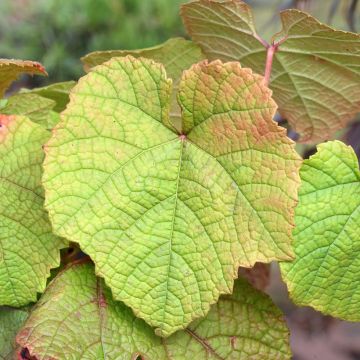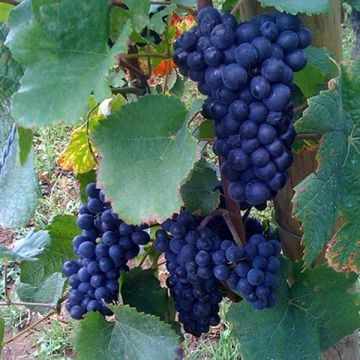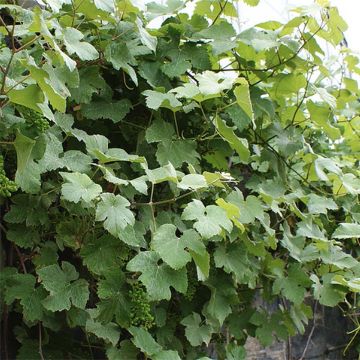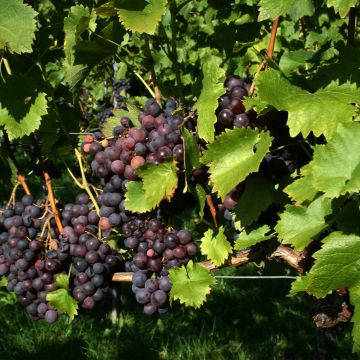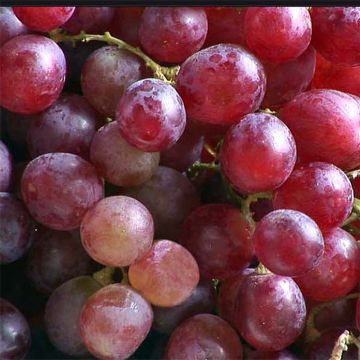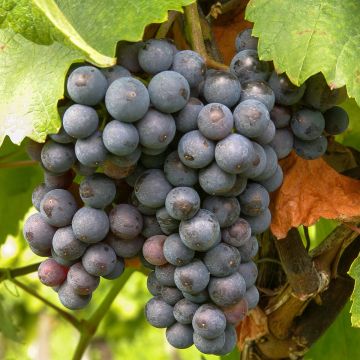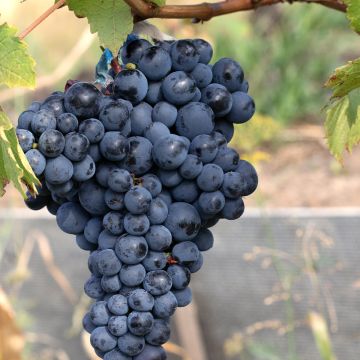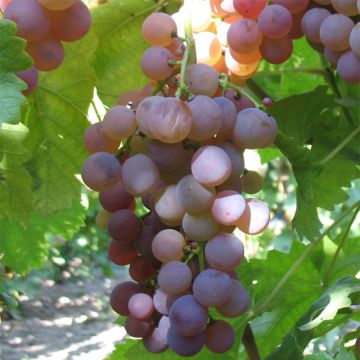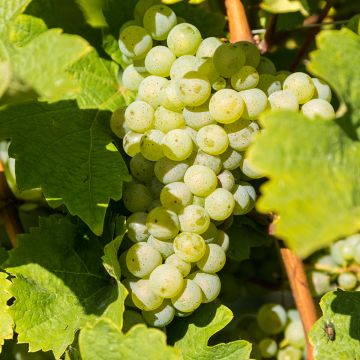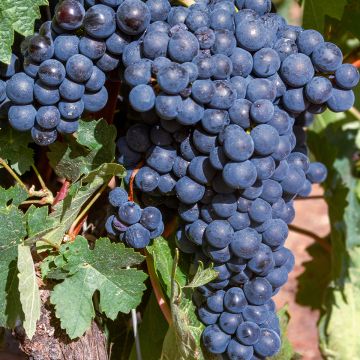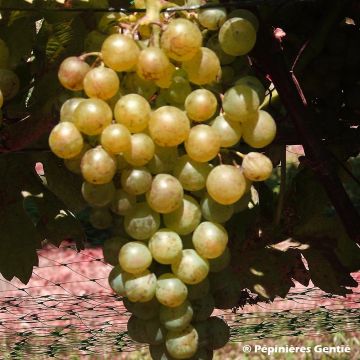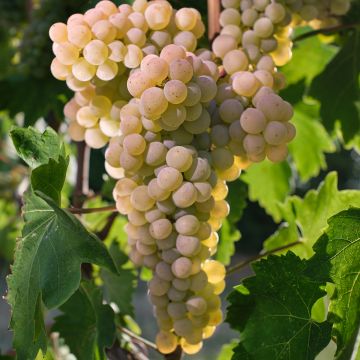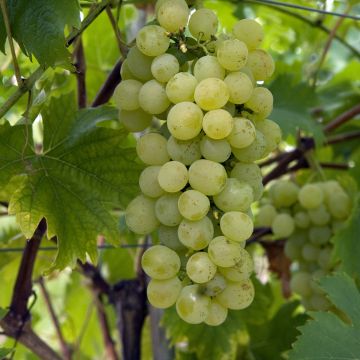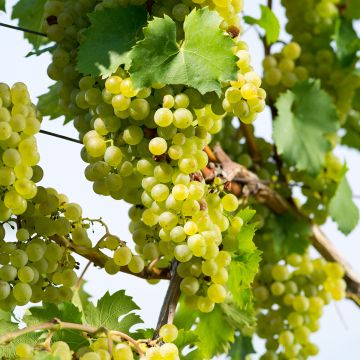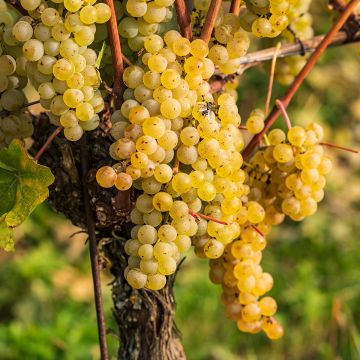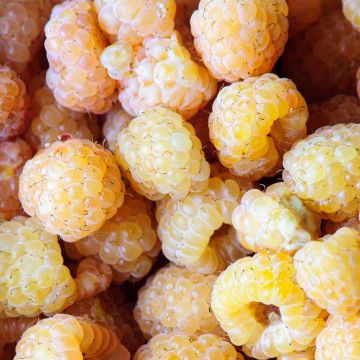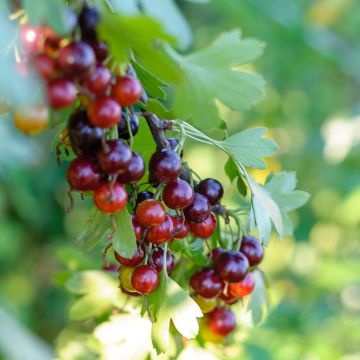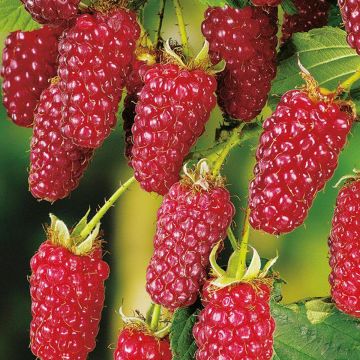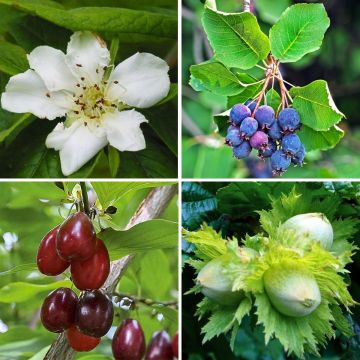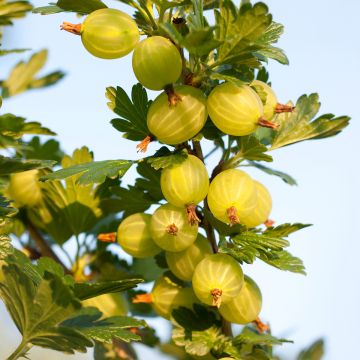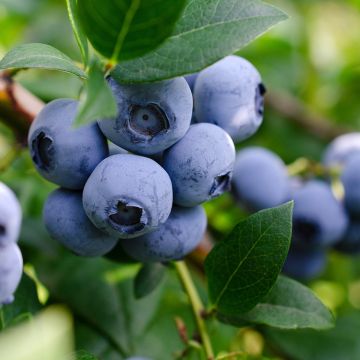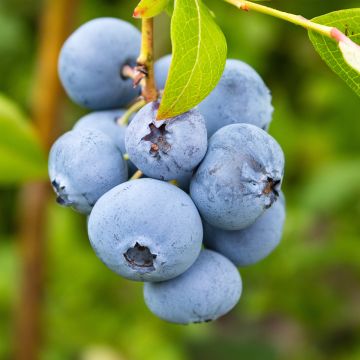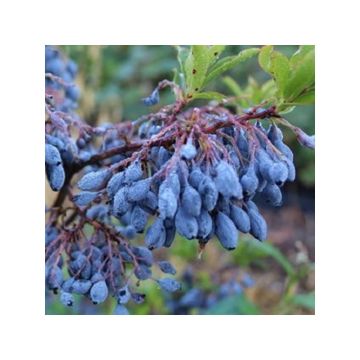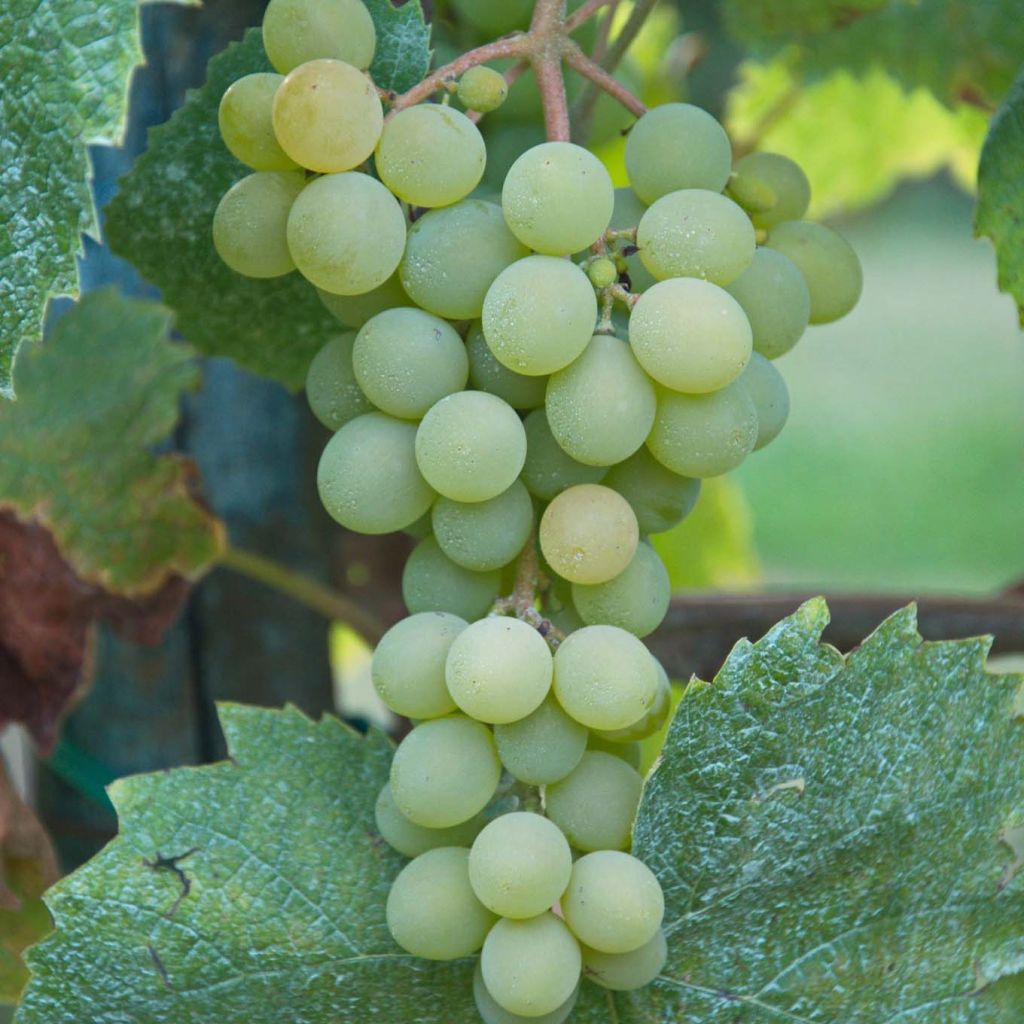

Vigne sans pépin Aperina bianca
Vitis vinifera Aperina bianca - Grape vine
Vitis vinifera Apirena bianca
Common Grape Vine, European Grape, Wine Grape
Planted in early April. Good growth and a few fruits starting to develop.
Adeline, 31/05/2023
Special offer!
Receive a €20 voucher for any order over €90 (excluding delivery costs, credit notes, and plastic-free options)!
1- Add your favorite plants to your cart.
2- Once you have reached €90, confirm your order (you can even choose the delivery date!).
3- As soon as your order is shipped, you will receive an email containing your voucher code, valid for 3 months (90 days).
Your voucher is unique and can only be used once, for any order with a minimum value of €20, excluding delivery costs.
Can be combined with other current offers, non-divisible and non-refundable.
Why not try an alternative variety in stock?
View all →This plant carries a 6 months recovery warranty
More information
We guarantee the quality of our plants for a full growing cycle, and will replace at our expense any plant that fails to recover under normal climatic and planting conditions.
Would this plant suit my garden?
Set up your Plantfit profile →
Description
This 'Aperina Bianca' vine is part of a series of descendants of the 'Sultanine' grape (also known as 'Thompson Seedless'), a "seedless" variety cultivated on a large scale for the production of raisins. They all have the common characteristic of producing apyrene grapes, with atrophied seeds. Very enjoyable to taste, they will delight children! This 'Bianca' variety is similar to 'Italia', it is vigorous and resistant to cold. The plant produces large clusters of oval fruits, of good size, with slightly thick skin, and flesh that is juicy, fleshy, and sweet. The harvest takes place, depending on the regions, years, and climate, from late August to mid-September.
'Aperina Bianca' belongs, like all vines, to the Vitaceae family. Its first parent, the 'Sultanine' vine, is itself a very ancient hybrid, possibly originating from Afghanistan, which belongs to the category of white table grape varieties. The 'Sultanine' is a vigorous plant, which needs to be pruned long in late winter as its first buds do not produce flowers. It has passed on this characteristic to all its apyrene descendants.
The 'Aperina Bianca' vine is a woody climbing shrub, whose serpentine stems equipped with tendrils can exceed 5m (16ft) in length over time. It forms a trunk, often knotty and twisted, covered with fibrous and brown bark that flakes off in strips as it ages. Its long green stems bear beautiful round-shaped leaves, with serrated edges, of medium green colour, turning yellow before falling in autumn. It flowers in late spring, from May to June depending on the regions, in the form of dense and well-formed clusters, with a pyramidal shape, loaded with tiny green flowers. After pollination by insects, the berries that we call grapes are formed. Under their green to golden-green skin, quite thick and covered with a white bloom, the flesh is tender green in colour, almost devoid of true seeds. Juicy and sweet, it reveals a slightly musky aroma. This variety is pruned in late winter, after the frost, above 6-8 buds to promote the formation of new shoots that will flower.
Contrary to popular belief, seedless grapes are not genetically modified organisms, but they are the result of a complex selection process carried out by vine specialists. They are fruits borne by sterile hybrid plants, whose seeds, or seeds, are unable to develop: reduced to their simplest expression, these seeds are barely detectable in the mouth.
Planted in a sunny spot, the 'Aperina Bianca' vine will be very decorative along a wall, on a pergola, in the ground or in a large container on a terrace. This variety, both delicious and decorative, will be appreciated for garden ornamentation. Its fruits can be consumed as they are, mixed in fruit salads, as juice, or to garnish pies.
Report an error about the product description
Plant habit
Flowering
Foliage
Botanical data
Vitis
vinifera
Apirena bianca
Vitaceae
Common Grape Vine, European Grape, Wine Grape
Cultivar or hybrid
Other Grapevines
View all →Planting and care
The 'Aperina Bianca' Vine should be planted in a well-drained soil, preferably clay-limestone, even rocky, that you will have worked well and enriched with organic fertiliser or compost. Once well established, the vine can withstand summer drought, as its roots dive deep to seek moisture. Choose a full sun exposure, possibly partial shade in the south (southeast exposure). It can tolerate temperatures as low as -15°C (5°F) for very short periods. Prune it in February-March, after the frost, leaving 6 or 8 buds on the secondary branches. Prune it again once the berries have formed on the clusters, leaving 2 or 3 leaves above each cluster (this allows the sun to reach the fruits and the sap to nourish them more effectively). Once the structure of your trellis is formed, remove the branches that have produced fruits every year. Stake or train to support and guide the branches. Train it against a wall to directly benefit from the grapes. Downy mildew and powdery mildew are common (especially in rainy climates), which is why it is necessary to treat the vine as a precaution in spring and during summer, with Bordeaux mixture and/or sulfur powder. This vine may take a season to establish well, during which it will grow moderately. Its woody climbing stems will then gain several metres per year and will require pruning.
Planting period
Intended location
Care
-
, onOrder confirmed
Reply from on Promesse de fleurs
Similar products
Haven't found what you were looking for?
Hardiness is the lowest winter temperature a plant can endure without suffering serious damage or even dying. However, hardiness is affected by location (a sheltered area, such as a patio), protection (winter cover) and soil type (hardiness is improved by well-drained soil).

Photo Sharing Terms & Conditions
In order to encourage gardeners to interact and share their experiences, Promesse de fleurs offers various media enabling content to be uploaded onto its Site - in particular via the ‘Photo sharing’ module.
The User agrees to refrain from:
- Posting any content that is illegal, prejudicial, insulting, racist, inciteful to hatred, revisionist, contrary to public decency, that infringes on privacy or on the privacy rights of third parties, in particular the publicity rights of persons and goods, intellectual property rights, or the right to privacy.
- Submitting content on behalf of a third party;
- Impersonate the identity of a third party and/or publish any personal information about a third party;
In general, the User undertakes to refrain from any unethical behaviour.
All Content (in particular text, comments, files, images, photos, videos, creative works, etc.), which may be subject to property or intellectual property rights, image or other private rights, shall remain the property of the User, subject to the limited rights granted by the terms of the licence granted by Promesse de fleurs as stated below. Users are at liberty to publish or not to publish such Content on the Site, notably via the ‘Photo Sharing’ facility, and accept that this Content shall be made public and freely accessible, notably on the Internet.
Users further acknowledge, undertake to have ,and guarantee that they hold all necessary rights and permissions to publish such material on the Site, in particular with regard to the legislation in force pertaining to any privacy, property, intellectual property, image, or contractual rights, or rights of any other nature. By publishing such Content on the Site, Users acknowledge accepting full liability as publishers of the Content within the meaning of the law, and grant Promesse de fleurs, free of charge, an inclusive, worldwide licence for the said Content for the entire duration of its publication, including all reproduction, representation, up/downloading, displaying, performing, transmission, and storage rights.
Users also grant permission for their name to be linked to the Content and accept that this link may not always be made available.
By engaging in posting material, Users consent to their Content becoming automatically accessible on the Internet, in particular on other sites and/or blogs and/or web pages of the Promesse de fleurs site, including in particular social pages and the Promesse de fleurs catalogue.
Users may secure the removal of entrusted content free of charge by issuing a simple request via our contact form.
The flowering period indicated on our website applies to countries and regions located in USDA zone 8 (France, the United Kingdom, Ireland, the Netherlands, etc.)
It will vary according to where you live:
- In zones 9 to 10 (Italy, Spain, Greece, etc.), flowering will occur about 2 to 4 weeks earlier.
- In zones 6 to 7 (Germany, Poland, Slovenia, and lower mountainous regions), flowering will be delayed by 2 to 3 weeks.
- In zone 5 (Central Europe, Scandinavia), blooming will be delayed by 3 to 5 weeks.
In temperate climates, pruning of spring-flowering shrubs (forsythia, spireas, etc.) should be done just after flowering.
Pruning of summer-flowering shrubs (Indian Lilac, Perovskia, etc.) can be done in winter or spring.
In cold regions as well as with frost-sensitive plants, avoid pruning too early when severe frosts may still occur.
The planting period indicated on our website applies to countries and regions located in USDA zone 8 (France, United Kingdom, Ireland, Netherlands).
It will vary according to where you live:
- In Mediterranean zones (Marseille, Madrid, Milan, etc.), autumn and winter are the best planting periods.
- In continental zones (Strasbourg, Munich, Vienna, etc.), delay planting by 2 to 3 weeks in spring and bring it forward by 2 to 4 weeks in autumn.
- In mountainous regions (the Alps, Pyrenees, Carpathians, etc.), it is best to plant in late spring (May-June) or late summer (August-September).
The harvesting period indicated on our website applies to countries and regions in USDA zone 8 (France, England, Ireland, the Netherlands).
In colder areas (Scandinavia, Poland, Austria...) fruit and vegetable harvests are likely to be delayed by 3-4 weeks.
In warmer areas (Italy, Spain, Greece, etc.), harvesting will probably take place earlier, depending on weather conditions.
The sowing periods indicated on our website apply to countries and regions within USDA Zone 8 (France, UK, Ireland, Netherlands).
In colder areas (Scandinavia, Poland, Austria...), delay any outdoor sowing by 3-4 weeks, or sow under glass.
In warmer climes (Italy, Spain, Greece, etc.), bring outdoor sowing forward by a few weeks.






























